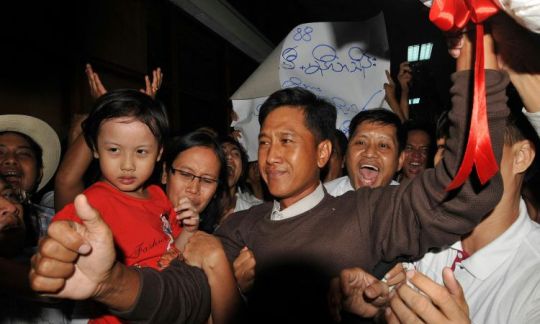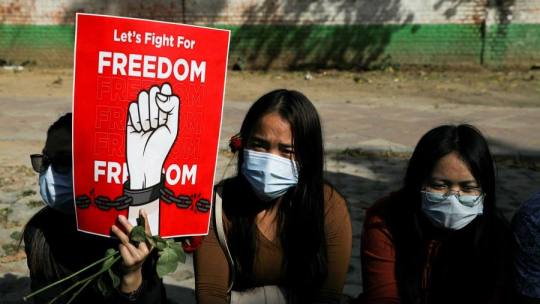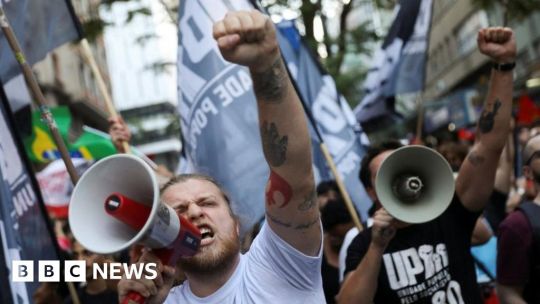#prodemocracy
Text

Guess I should do an introduction over here. My name is Amanda and I went undercover in the far right for a year. I have released some writing and audio, and I've got a big article coming out soon. Ask me anything!
#fuck maga#2022 midterms#fuck qanon#trumplicans#vote blue#antifascism#mike lindell#mypillow#democracy#prodemocracy#us politics#us capitol riot
7 notes
·
View notes
Photo

#Repost @jstreetdotorg with @use.repost ・・・ We continue to stand in solidarity with Israelis fighting to save their democracy. #proisrael #propeace #prodemocracy https://www.instagram.com/p/CqTFL15rl7Q/?igshid=NGJjMDIxMWI=
2 notes
·
View notes
Text
UK Requests Nicaragua Government Takes Responsibility
Official Government Statement
In the five years since the protests, the Nicaraguan Government has continued to disregard its national and international commitments to respect and uphold human rights and fundamental democratic and civic freedoms.
Thousands of civil society organisations have been outlawed, independent media operators have been silenced, and hundreds of representatives of civil society, pro-democracy activists, journalists, and opposition officials and politicians have been imprisoned, stripped of their citizenship and had their assets seized.
President José Daniel Ortega Saavedra. Photo by 總統府. Wikimedia.
The UK shares deep international concern at the situation in Nicaragua. We call on President Ortega and the Nicaraguan Government to restore full respect for the human rights of all Nicaraguans and allow international human rights bodies including the Office of the High Commissioner for Human Rights and the Inter-American Commission on Human Rights to return to Nicaragua to carry out their legitimate mandates.
We continue to call for the immediate and unconditional release of all political prisoners, and for those Nicaraguans who have been deprived of their nationality to have it restored, and for all those people who have been wrongfully stripped of their assets to have them returned.
Sources: THX News & Foreign, Commonwealth and Development Office.
Read the full article
0 notes
Photo

Here’s my full-length fashion shot of pro-democracy Joy-Ann Reid at the 'The 1619 Project' Los Angeles Premiere. @joyannreid #joyannreid @msnbc #msnbc @thereidout #thereidout #prodemocracy @hulu #hula #the1619project @acedamymuseumofmotionpictures #academymuseumofmotionpictures @the1619project #fashionlooks #redcarpetfashion #redcarpetstyle (at Academy Museum of Motion Pictures) https://www.instagram.com/p/CoD3sP8pcVx/?igshid=NGJjMDIxMWI=
#joyannreid#msnbc#thereidout#prodemocracy#hula#the1619project#academymuseumofmotionpictures#fashionlooks#redcarpetfashion#redcarpetstyle
0 notes
Text
میانمار میں جمہوریت پسند چار کارکنوں کو سزائے موت
میانمار میں جمہوریت پسند چار کارکنوں کو سزائے موت
میانمار میں جمہوریت پسند چار کارکنوں کو سزائے موت
ینگون؍لندن ، 25 جولائی ( آئی این ایس انڈیا)
میانمار کے سرکاری میڈیا نے پیر کو کہا ہے کہ فوجی حکام نے ’دہشت گردانہ سرگرمیوں‘ میں مدد کرنے کے الزام میں جمہوریت پسند چار کارکنوں کو سزائے موت دے دی ہے۔برطانوی خبر رساں ادارے روئٹرز کے مطابق جنوب مشرقی ایشیائی ملک میں کئی دہائیوں میں پہلی مرتبہ سزائے موت دی گئی ہے۔ان چاروں افراد کا رواں برس جنوری میں…

View On WordPress
0 notes
Text
Live news updates: Myanmar junta executes four pro-democracy activists
Live news updates: Myanmar junta executes four pro-democracy activists
Let the games begin. No, not the acrimonious tussle between the final two candidates in the Conservative party’s leadership election — although you can watch that on the BBC on Monday. This week is the start of the Commonwealth Games in the UK’s second-largest city, Birmingham.
The opening day of the international sports fest will be marred by that other big event of the 2022 British summer:…

View On WordPress
0 notes
Text
Former security chief who led pro-democracy crackdown anointed Hong Kong's new leader
Former security chief who led pro-democracy crackdown anointed Hong Kong’s new leader
John Lee, 64, was the only candidate in a Beijing-backed one-horse race to succeed outgoing leader Carrie Lam.
His elevation places a security official in the top job for the first time after a tumultuous few years for a city battered by political unrest and debilitating pandemic controls.
Despite the city’s mini-constitution promising universal suffrage, Hong Kong has never been a democracy, the…

View On WordPress
#anointed#breaking news#chief#crackdown#global news#Hong#Kongs#Latest news#latest news and updates#leader#Led#News Churn#prodemocracy#Security
0 notes
Text
"American democracy is dying. There are plenty of medicines that would cure it. Unfortunately, our political dysfunction means we’re choosing not to use them, and as time passes, fewer treatments become available to us, even though the disease is becoming terminal. No major prodemocracy reforms have passed Congress. No key political figures who tried to overturn an American election have faced real accountability. The president who orchestrated the greatest threat to our democracy in modern times is free to run for reelection, and may well return to office.
Our current situation started with a botched diagnosis. When Trump first rose to political prominence, much of the American political class reacted with amusement, seeing him as a sideshow. Even if he won, they thought, he’d tweet like a populist firebrand while governing like a Romney Republican, constrained by the system. But for those who had watched Trump-like authoritarian strongmen rise in Turkey, India, Hungary, Poland, the Philippines, Sri Lanka, Thailand, and Venezuela, Trump was never entertaining. He was ominously familiar.
At issue was a classic frame-of-reference problem. America’s political culture is astonishingly insular. Turn on cable news and it’s all America, all the time. Other countries occasionally make cameos, but the story is still about us. (Poland is discussed if Air Force One goes to Warsaw; Iran flits into view only in relation to Washington’s nuclear diplomacy; Madagascar appears only in cartoon form, mostly featuring talking animals that don’t actually live there.) Our self-obsession means that whenever authoritarianism rises abroad, it’s mentioned briefly, if at all. Have you ever spotted a breathless octobox of talking heads on CNN or Fox News debating the death of democracy in Turkey, Sri Lanka, or the Philippines?
That’s why most American pundits and journalists used an “outsider comes to Washington” framework to process Trump’s campaign and his presidency, when they should have been fitting every fresh fact into an “authoritarian populist” framework or a “democratic death spiral” framework. While debates raged over tax cuts and offensive tweets, the biggest story was often obscured: The system itself was at risk.
Even today, too many think of Trump more as Sarah Palin in 2012 rather than Viktor Orbán in 2022. They wrongly believe that the authoritarian threat is over and that January 6 was an isolated event from our past, rather than a mild preview of our future. That misreading is provoking an underreaction from the political establishment. And the worst may be yet to come.
The basic problem is that one of the two major parties in the U.S.—the Trumpified Republican Party—has become authoritarian to its core. Consequently, there are two main ways to protect American democracy. The first is to reform the GOP, so that it’s again a conservative, but not authoritarian, party (à la John McCain’s or Mitt Romney’s Republican Party). The second is to perpetually block authoritarian Republicans from wielding power. But to do that, Democrats need to win every election. When you’re facing off against an authoritarian political movement, each election is an existential threat to democracy. Eventually, the authoritarian party will win...
That leaves American democracy with a bleak prognosis. Barring an electoral wipeout of Republicans in 2022 (which looks extremely unlikely), the idea that the party will suddenly abandon its anti-democracy positioning is a delusion.
Prodemocracy voters now have only one way forward: Block the authoritarian party from power, elect prodemocracy politicians in sufficient numbers, and then insist that they produce lasting democratic reforms.
The wish list from several democracy experts I spoke with is long, and includes passing the Electoral Count Act, creating a constitutional right to vote, reforming districting so more elections are competitive, establishing a nonpartisan national election-management body, electing the president via popular vote, reducing the gap in representation between states like California and Wyoming, introducing some level of proportional representation or multimember districts, aggressively regulating campaign spending and the role of money in politics, and enforcing an upper age limit for Supreme Court justices. But virtually all of those ideas are currently political fantasies."
#this article is kinda annoying in a very The Atlantic sort of way#but the central point is the one i've been trying to make all along which is that our own american exceptionalism will be the death of us#usa continues having an extremely normal one#politics#news
16 notes
·
View notes
Text
The crowd gathered in a wood-paneled London hall struggled to contain their enthusiasm: Like music fans catching a glimpse of their favorite act peering out from backstage, people excitedly clapped and chattered when Chris Patten, the last governor of Hong Kong, entered to take his seat. They later rose to their feet in raucous applause as he delivered his speech, a lament about the diminishing freedoms in Hong Kong under Chinese rule. Hours earlier, in Hong Kong, Chinese President Xi Jinping had offered his own view, a stern defense of the city’s forceful integration with the mainland carried out through the introduction of a sprawling national-security law, the reengineering of the election system, and the mass arrest of prodemocracy figures.
Both events earlier this month marked the 25th anniversary of Hong Kong being returned to China. Patten’s appearance capped a string of events that had drawn activists, former lawmakers, and exiles to London for a week of lobbying, commemoration, and nostalgia for the protest movement. It was a remarkable scene, the aging head of a former imperial power emphatically cheered by former subjects who had fled their ostensibly decolonized homeland. Most of the Hong Kongers at the London event, a show of hands revealed, had arrived in the United Kingdom after the British government had broken with long-standing immigration policy to welcome them in. Many seeking refuge in the seat of the former empire have done so because it allows them to live and outwardly express an identity that Beijing is intent on stamping out as it imposes its own form of colonial rule and imperialist tendencies.
Some 120,000 Hong Kongers have taken part in the program in the 18 months since it was launched, according to outgoing Prime Minister Boris Johnson. The initiative, which is an expansion of the British National Overseas passport scheme, a special status created before the 1997 handover, potentially allows millions of Hong Kongers to stay in the U.K. on a pathway to citizenship. It also helps them avoid the grinding bureaucratic labyrinth of Britain’s asylum system. (The government refers to it as a “bespoke immigration route,” as if it were tailored on Savile Row.) The Welcoming Committee for Hong Kongers, a nonprofit umbrella group assisting new arrivals, estimates that up to half a million could come to live in Britain over the next few years. Sunder Katwala, the director of British Future, a think tank that houses the Welcoming Committee, said this month that the influx could “reshape Britain.”
This acceptance of Hong Kongers marks an extraordinary turn for the British government, which for decades staunchly defended the practice of denying its former subjects the right of abode. In 1982, as focus turned toward Hong Kong’s impending handover back to China, then–Foreign Secretary Peter Carington wrote to Prime Minister Margaret Thatcher, warning of the threat of mass migration should things not proceed smoothly. The U.K., he cautioned, “would be faced with demands of Hong Kong people for guarantees of protection and, more than likely, for the right of admission of fairly large numbers to this country.” Not long after he wrote the memo, Argentina invaded and occupied the Falkland Islands. Carington resigned from his post, but his position toward keeping Hong Kongers out of Britain remained.
In 1989, the Tiananmen Square massacre brought the issue to the forefront again. Then–Hong Kong Governor David Wilson traveled to Downing Street shortly after the crackdown and argued that allowing Hong Kongers the chance to migrate to Britain would, counterintuitively, boost confidence in the city, and, in an attempt to sell the idea to Thatcher, said he believed that not many would actually take up the offer. Murray MacLehose, a former Hong Kong governor, called for an amendment to the British Nationality Act to allow for Hong Kongers to obtain citizenship. His plea went unanswered. Instead, full British passports were issued to 50,000 priority Hong Kongers, though even this consolation was condemned by Beijing. It was “not a glorious outcome,” the journalist Michael Sheridan recounted in his book The Gate to China: A New History of the People’s Republic and Hong Kong.
By the time Patten arrived in Hong Kong in 1992, much was already set for Hong Kong’s future ahead of the 1997 handover. He pushed to expand democracy but met fierce resistance from Beijing and some in London. In recent years, he has cast himself as an outspoken crusader, enraging Beijing with his numerous media appearances. His criticism of China and his defense of Hong Kong have, in a way, helped absolve the British of some of the uglier aspects of their rule over the city, including police violence in the 1960s and draconian laws that remain on the books. These relics of empire have been almost gleefully embraced by Beijing loyalists. Colonial laws drafted by the British have been revived by Hong Kong’s new rulers; the charge of sedition has proved particularly popular. The police force that cracked down on the protests and has been transformed into an arm of the ever-expanding national-security apparatus is a distinctly British creation: The title Royal has been dropped from the force’s name, but a few high-ranking British officers remain in uniform.
Jeppe Mulich, a lecturer in modern history at City, University of London, told me the rosy vision of Hong Kong’s past that is often projected within the U.K. is troubling, with much focus on commemorating the last few years of British rule but little on what came before, because “it really is not a very pretty picture in any way.” Patten, who recently published his diaries detailing his time as Hong Kong’s final governor, is “a reliable symbol of the good old days of colonial Hong Kong,” Mulich said, but in reality, “he was a Band-Aid put on a big bleeding wound at much too late a stage.”
Those in attendance at the event I went to in London were hugely sympathetic to the former governor. One audience member asked him about what he made of the colonial legacy in Hong Kong. Patten responded by musing on the astronomy of empire: Britain prepared former colonies such as Singapore and Malaysia for their futures, “put them all onto the launching pad and lit them with touch paper and blasted the whole thing off into outer space,” hoping that they would take to orbit as an “independent and successful country,” he said. But, “with Hong Kong, because of the lease, we couldn’t do that,” he told the audience, referencing the 99-year agreement signed with Beijing in 1898. Instead, Patten explained, the city was “fired off not into orbit on its own but into a docking mechanism with mainland China and that caused a very, very different set of problems.”
Contemporary Hong Kongers are often criticized for harboring too much sympathy for colonial rule. I frequently saw the old colonial flag flying at the numerous marches I attended in 2019. A protester hung it inside the Legislative Council chamber when it was stormed by demonstrators at the height of the prodemocracy movement. Before Xi’s visit this month, a series of videos showing Queen Elizabeth II and Princess Anne made the rounds on social media, with commentators praising the royals for meeting Hong Kongers and visiting housing estates on their visits to the city, in contrast to the imperious distance typically maintained by Xi.
A certain level of colonial nostalgia is understandable given the changes in the city over the past decade, Mulich told me; some view Britain as the lesser of two evils when set against Beijing’s increased influence. Claudia Mo, a former prodemocracy lawmaker who covered the lead-up to the handover as a journalist, told me that she questioned at the time, “Why are we being ruled by foreigners?” and was nagged by the feeling that there was “something not right” about Hong Kong’s governance during colonial times. She had been excited to see Hong Kong return to Chinese rule, but eventually soured on Beijing’s control of the city and became a strident critic in the legislature. Mo was arrested last year and faces the possibility of life in prison for violating the national-security law.
Deference toward the British was also actively fostered prior to the handover. Decades of colonial education “helped cultivate a sense of belonging to the British empire amongst those who were born and raised before 1997,” Vivian Wong, a lecturer in modern Chinese history at the University of Bristol, told me. Members of Hong Kong’s civil society have also “long deployed the rhetoric of imperial cosmopolitanism as a strategic tool to counteract Chinese nationalism,” she added, though this “rosy understanding of British colonial rule” was not universally held.
Prior to Patten’s speech, I made my way into Parliament, past groups of summer tourists and groups of pro- and anti-Brexit protesters engaged in a heated exchange, to attend a roundtable on Hong Kong. One of the speakers was Timothy Lee, a former district councilor who was elected in November 2019 when prodemocracy candidates nearly ran the table in local elections. I had last interviewed Lee after his first district-council meeting. Then, he had been buzzing with nervous energy, words tumbling out of his mouth at a pace that was at times hard to follow. Yet his tenure as a politician was short-lived. Lee left Hong Kong on March 1, 2021, a day after 47 prodemocracy figures, many of them his friends, were arrested for violating the national-security law.
When he landed in London, it was his first time anywhere in Europe. He initially entered as a visitor, moving from place to place, before heading to Taiwan. Though Taipei had been supportive of Hong Kongers during the protests, its immigration policies remain restrictive. Lee found the limitations on his right to work onerous. He returned to London three months later and successfully took part in the new immigration program. He has since settled into an office job and in his spare time does advocacy work. His business card describes him as “one of the last elected district councilors from Hong Kong.”
Lee now lives in a crowded part of London where the streets are busy, like back home. The double-decker buses and the city’s underground remind him of Hong Kong. His decision to leave wasn’t driven by fear of imprisonment so much as by the collapsing space for free speech and the threat of self-censorship. “If I remain in Hong Kong, maybe I won’t get arrested, maybe I will. This is one uncertainty,” Lee explained to me. “But one thing I can be sure of: If I remain in Hong Kong there are many things I used to be able to say that I will not be able to say anymore.” (Shortly after we spoke, an elderly activist with Stage 4 cancer was sentenced to nine months in prison for a protest that had been planned but never took place. The same week, several men were arrested for sharing a Facebook post calling for people to cast blank ballots in the December 2021 elections.)
Others who have fled Hong Kong’s shrinking space for any views or identity beyond those deemed sufficiently patriotic have found a more welcoming home in Britain too. One notably bright Friday, I stepped into the dimly lit foyer of Prince Charles Cinema near Leicester Square and followed a set of signs down a flight of stairs to a theater showing Revolution of Our Times, a documentary about the 2019 protests. The award-winning film was released last month on the video-streaming site Vimeo, but Hong Kong’s police chief has warned the city’s residents against viewing it, and the title is a portion of a now-outlawed protest slogan.
The name of the cinema struck me as ironic. Charles had attended the handover ceremonies 25 years earlier, saluting the Union Jack in his white military dress uniform as the flag came down for the final time. The film was shown at midday, but the theater was almost full. In the lobby, a table was covered with mementos of 2019 for sale, most of which would put the seller at risk in Hong Kong. As the documentary played, sniffles and muffled sobs from the audience offered something of a secondary soundtrack to the film’s original score. Tissue packets crinkled in the darkness as strangers offered them to those sitting nearby. As the documentary ended, people sang along to “Glory to Hong Kong,” an unofficial anthem that was written during the protests.
Among those I met in London was Lilith Leung, a social worker in Hong Kong who was arrested twice during those protests, and who came to Britain via the immigration program. She cried, she told me, as she watched Hong Kong disappear below the plane as she flew out of the city in October.
Leung struggled with English when she first arrived, but being forced to use the language daily has helped her improve. Since moving to London, she has also begun to transition to living as a woman. The prevalence of the term prodemocracy at times obscures the fact that the victims of Beijing’s overhaul of Hong Kong reach far beyond the realm of election politics: civil society, progressive action groups, and individuals who depart from the authorities’ view of the norm. Leung previously worked with the city’s oldest prodemocracy party and its largest trade union. The union closed in the wake of the national-security law, along with dozens of other civil-society groups.
Leung told me she was reluctant to live as a woman in Hong Kong under the more authoritarian political regime now in place. She took the acceptance and encouragement she had received from new friends in London as a sign of the city’s openness compared with Hong Kong, where she saw such openness in steep decline. “It is interesting,” she told me, “that a place can give you the courage to live as yourself and trust yourself. It is a great expression of freedom.”
#nunyas news#think a influx of people that appreciate#the freedoms offered in the UK#isn't going to be a terrible thing
14 notes
·
View notes
Text
Making all the al’Vere sisters be prodemocracy in my fic and not like Perrin being lord of the two rivers to imply to the reader that’s why we never saw them in TSR even though they literally live in the Winespring Inn
#also because why would these people want a lord? especially the mayor’s daughters#although Perrin is so clueless he could have just never noticed them#wot book spoilers#wot#wheel of time#alene al'vere of the white tower
5 notes
·
View notes
Video
youtube
☀️ Morning Musical Affirmation...Motivationally Uplifting🦋🩵🎶 👇🏼 𝑹𝒆𝒑𝒆𝒂𝒕 𝒊𝒏 𝒚𝒐𝒖𝒓 𝒎𝒊𝒏𝒅 𝒐𝒓 𝒐𝒖𝒕 𝒍𝒐𝒖𝒅 𝒘𝒊𝒕𝒉 𝒎𝒆 🧘🏻♀️ Like the vibrant roses blossoming by the tranquil waters, I am constantly blooming in the garden of life. Each new day nurtures my soul, allows me to grow, and fills me with renewed energy and grace. Today, I choose to embrace my journey with optimism and allow my true colors to shine. 𝑺𝒕𝒂𝒚 𝒑𝒐𝒔𝒊𝒕𝒊𝒗𝒆, "����” 🦋🩵🎶 𝑽𝒐𝒕𝒆 𝑩𝒍𝒖𝒆 𝑻𝒐 𝑺𝒂𝒗𝒆 𝑶𝒖𝒓 𝑷𝒍𝒂𝒏𝒆𝒕🩵 #Earth🌎 𝑹𝒆𝒈𝒊𝒔𝒕𝒆𝒓👉🏼Vote.gov 🗳 Follow Me On Social Media: Threads: https://www.threads.net/@musicalhypnosis Bluesky: https://bsky.app/profile/musicalhypnosis.com Instagram: https://www.instagram.com/musicalhypnosis YouTube: https://www.youtube.com/c/musicalhypnosis TikTok: https://www.tiktok.com/@musicalhypnosis Facebook: https://www.facebook.com/musicalhypnosis Pinterest: https://www.pinterest.com/musicalhypnosis/musical-hypnosis Tumblr: https://www.tumblr.com/blog/musicalhypnosis #MusicalHypnosis #MusicalAffirmations#M #ProDemocracy #Affirmations #EDM #ElectronicMusic #ElectronicMeditationMusic #Music #PositiveAffirmations #MeditationMusic #SubliminalAffirmations #SolfeggioMusic #174Hz #285Hz #396Hz #417Hz #432Hz #528Hz #639Hz #741Hz #852Hz #963Hz #SolfeggioTones #SolfeggioFrequencies #432HzMusic #IsochronicTones #BinauralBeats 🎶 Online Store: musicalhypnosis.com 🎶
0 notes
Text
0 notes
Text
0 notes
Text
God: your confidence
Word for Today written by Bob and Debby Gass
Monday 9th October 2023
'Those who trust in the Lord...cannot be shaken.' Psalm 125:1 NIV
People are naturally attracted to leaders who convey poise and self-assurance; they won't follow one who lacks self-confidence. An excellent illustration of this is an incident that took place in Russia during an attempted coup. Army tanks encircled the government building that held President Boris Yeltsin and his prodemocracy supporters. As the army moved into position, Yeltsin strode from the building, climbed up on a tank, stared the commander in the eye, and thanked him for turning to the side of democracy. Later the commander admitted that although he hadn't intended to go over to Yeltsin's side, the Russian leader appeared so confident that the soldiers decided to join him. Great achievers exhibit confidence regardless of circumstances.
But true confidence doesn't come from human approval. The Bible says, 'The Lord will be your confidence' (Proverbs 3:26 NKJV); it's about knowing he's called and equipped you to do the job. Paul wrote, 'We feel certain before God...[he] makes us able to do all that we do' (2 Corinthians 3:4-5 NCV). Even though others may not believe in you, knowing God believes in you enables you to believe in yourself. David wrote, 'Many are saying of me, "God will not deliver him." But you, Lord, are a shield around me...the one who lifts my head high' (Psalm 3:2-3 NIV).
A confident leader can say to those who follow him or her, 'I have confidence in the God who called me. I have confidence in you. I believe that together we can accomplish what God wants done.'
0 notes
Text
Brazil Congress: Big pro-democracy rallies held to condemn rioters
Brazil Congress: Big pro-democracy rallies held to condemn rioters
They come after supporters of ex-President Jair Bolsonaro ransacked the heart of the Brazilian state.
#Brazil #Congress #Big #prodemocracy #rallies #held #condemn #rioters

View On WordPress
0 notes